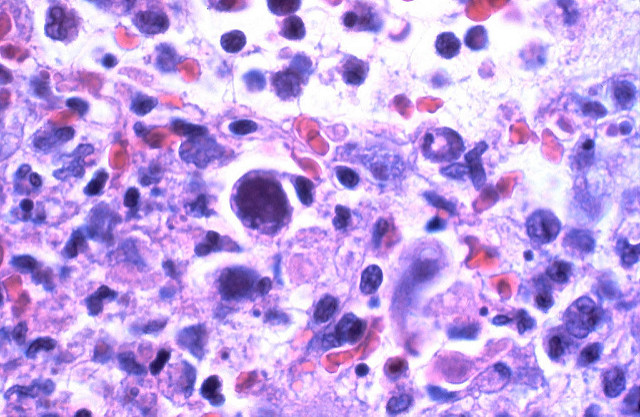Imagine if a dormant virus were secretly infecting the entire world. The virus doesn’t cause symptoms, but lies waiting in the body for the rest of the individual’s life. There is no cure. One day, every individual in the world might be infected. While it sounds like a badly written sci-fi plot, this situation is actually quite real. Cytomegalovirus, or CMV, comes from the herpes family and has infected nearly 80% of the world’s total population.
There are two types of CMV: congenital and acquired. Congenital CMV occurs in babies who are infected with CMV in the womb. Acquired CMV occurs when an individual is infected later in life. Usually, CMV is asymptomatic and dormant; however, congenital CMV can sometimes cause disabilities. For this reason, pregnant women should be especially careful to avoid contact with anyone who may have CMV. CMV can be diagnosed with a blood test, a urine test, or tissue biopsy.
Image Source: Veronika Burmeister
There is no cure for CMV. The virus stays in an infected individual for life. Usually, it does not cause any complications. However, it can be dangerous in immunocompromised patients, such as HIV positive individuals. In these cases, CMV travels around the body and begins to affect specific organs and systems. Some common complications of CMV include:
- Floaters in the field of vision, blind spots, and eventual blindness
- Pain or numbness in the spine
- Throat irritation
- Diarrhea
For immunocompromised patients facing complications related to CMV, some treatment options are available. Common drugs that prevent the cytomegalovirus from replicating include:
Unfortunately, drugs for the treatment of CMV can cause quite serious side effects, including kidney problems. Thus, in immunocompromised patients, it is very important to weigh the pros and cons of treating a patient with CMV since it may do more harm than good. For the typical individual with a relative healthy immune system, no further treatment or medication is required since the virus has no symptoms.
Feature Image Source: Cytomegalovirus infection by Yale Rosen










